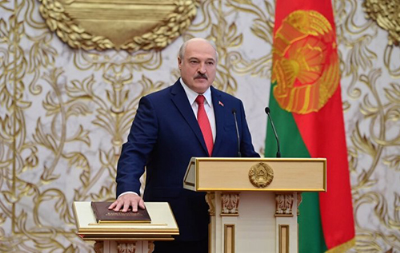
©
25 березня 2025 року Олександр Лукашенко офіційно вступив на сьомий президентський термін. Церемонія інавгурації відбулася в Палаці Незалежності в Мінську за участю понад 1100 гостей. Лукашенко виголосив присягу білоруською мовою, поклавши руку на Конституцію, після чого голова Центральної виборчої комісії вручила йому посвідчення президента. Призначення інавгурації на 25 березня – День Волі, який відзначає білоруська опозиція, – викликало значний резонанс. Політологи вбачають у цьому демонстративний жест, покликаний підкреслити владу Лукашенка та його контроль над країною. У своїй промові він заявив: "Пів світу мріє про нашу диктатуру – диктатуру реальних справ і інтересів народу", наголосивши, що в Білорусі "зі свободою слова все гаразд" і що "демократії тут більше, ніж у тих, хто називає себе її еталоном". Світові лідери та міжнародні організації засудили інавгурацію, заявивши, що вибори в Білорусі не були вільними та демократичними. Висока представниця ЄС із закордонних справ Кая Каллас назвала голосування "відвертою наругою над демократією" та заявила, що його результати є фіктивними. Міністерка закордонних справ Німеччини Анналена Бербок заявила, що це "гіркий день для всіх, хто прагне свободи і демократії". Міністр закордонних справ Польщі Радослав Сікорський саркастично зауважив, що "лише" 87,6% виборців підтримали Лукашенка, запитавши, чи "решта помістяться у в'язницях". Опозиційна лідерка Світлана Тихановська, яка перебуває у вигнанні, назвала вибори "фарсом" та закликала світових лідерів не визнавати їх результати. Міністерство закордонних справ України також заявило, що немає підстав вважати голосування 26 січня справжніми президентськими виборами. Інавгурація Лукашенка ще більше поглибила ізоляцію Білорусі на міжнародній арені та засвідчила її залежність від Росії.
Lukashenko’s Inauguration: Global Response to His Seventh Presidential Term
On March 25, 2025, Alexander Lukashenko was sworn in for his seventh presidential term. The inauguration ceremony took place at the Palace of Independence in Minsk, attended by over 1,100 guests. Lukashenko took the oath in Belarusian, placing his hand on the Constitution before receiving the presidential certificate from the head of the Central Election Commission. The choice of March 25—"Freedom Day," celebrated by the Belarusian opposition—sparked significant controversy. Analysts view it as a symbolic move aimed at reinforcing Lukashenko’s grip on power. In his speech, he declared: "Half the world dreams of our dictatorship—a dictatorship of real deeds and national interests." He also insisted that "freedom of speech is well protected" in Belarus and that "we have more democracy than those who claim to be its standard-bearers." World leaders and international organizations condemned the inauguration, stating that the elections in Belarus were neither free nor fair. EU High Representative for Foreign Affairs Kaja Kallas called the vote a "blatant mockery of democracy" and said its results were fraudulent. German Foreign Minister Annalena Baerbock described the event as "a bitter day for everyone striving for freedom and democracy." Polish Foreign Minister Radosław Sikorski sarcastically remarked that "only" 87.6% of voters backed Lukashenko, asking whether "the rest will fit in prisons." Exiled opposition leader Sviatlana Tsikhanouskaya denounced the election as a "farce" and urged world leaders not to recognize its outcome. Ukraine’s Ministry of Foreign Affairs stated that the January 26 vote could not be considered a legitimate presidential election. Lukashenko’s inauguration further deepened Belarus’s international isolation and underscored its growing dependence on Russia.
987